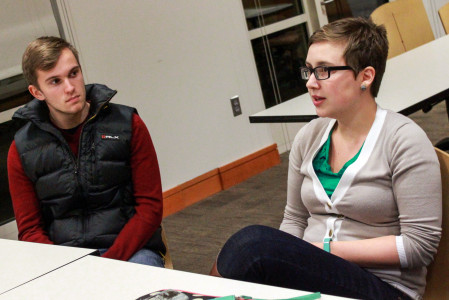
Photo by Misha Gelnarova.
As part of an ongoing effort to explore the ways in which society treats and supports people with disabilities, representatives of the Center for Careers, Life and Service have structured a week and a half long series of events in recognition of Disability Cultures Week from Feb. 3 through March 4. Dean of the College and Coordinator of Disability Resources Autumn Wilke and Career Counselor Kelly Guilbeau worked together to organize tabling sessions and two discussions centered around the social and legal environment associated with having a disability, which took place on Tuesday and Thursday night in JRC 209.
Wilke explained that while accessibility issues and disabilities awareness are discussed relatively frequently, she thought it was also important to understand disability as an identity category and other places where people aren’t thinking about disability and accessibility.
“We are finding ways of reframing one’s disability to highlight different ways on how you identify, that you are really strong, not just as a source of weakness,” Wilke said. “Our society really operates around the medical narrative of disability, as opposed to the social impact of what you can and can’t do, and who you are.”
During Tuesday evening’s discussion, different students and staff members shared their own experiences with discussing their disabilities when applying for jobs or internships, and how to approach difficulties that frequently arise while doing so.
“It’s really interesting how people react to and accommodate you in that environment,” one student said. “I have to grapple with the question, is this something I want to be open about?”
Professor Michael Gill, Gender, Women’s and Sexuality Studies, detailed his own experiences applying for positions in academia and research.
“You need to be aware of how stigma operates: how people make assumptions about stigmas and what employers are expected to do to accommodate you legally,” Gill explained.
Additionally, participants in the discussion surveyed the process of filing disclosure statements with the Federal Equal Employment Opportunity Commission and working with human resources departments to inquire about accommodation standards and workplace atmosphere.
“There is the building of an interpersonal relationship through the recognition of a disability … which can become a very accommodating space,” Gill said. “Part of that is an education process: your fellow coworkers can help normalize the environment for you.”
Wilke and Gill advised that although employers can be skeptical and possibly rude about the effects of different disabilities, it is important that after applicants and employees disclose their disabilities under contractual obligation, they should not feel uncomfortable explaining the effects of their disorders to others to the extent that they themselves feel is appropriate.
“The benefit of going through HR is that they can back you up, you have been ‘vetted,’ and there is no need to disclose anything you do not wish to, to your peers,” Wilke said. “It’s unfortunate that people only focus on the formal language of the disorder itself, as opposed to how that disorder affects you and what strengths and weaknesses you have as a result.”
On Thursday, a panel featuring Director of Human Resources Kristin Lovig, Senior Research Associate Jennifer Krohn and Wilke reviewed what companies are legally required to provide in regards to disability accommodations and the protections afforded by the Americans with Disabilities Act.
However, Wilke emphasized that another focus of Disability Cultures Week is to increase awareness of different obstacles and impediments, which students who don’t have physical or mental disabilities may never notice. She cited the white tape boundaries that have recently been created for backpacks and jackets, as recently haphazardly thrown items have severely impeded the mobility of students who have difficulty maneuvering around.
“It’s something which many students won’t notice, but those backpacks create a huge obstacle for students with disabilities,” she said.
Wilke added that even as various student groups and task forces work on different projects to help make Grinnell a more disability-friendly and aware campus, it’s important to keep in mind the social aspects and multiple pockets of disability cultures that frequently go unrecognized.
“There are a lot of places where people don’t think about, which really affect issues of accessibility and disability. Hopefully, we can continue to educate people and help them be aware of the challenges that face their peers.”




























































